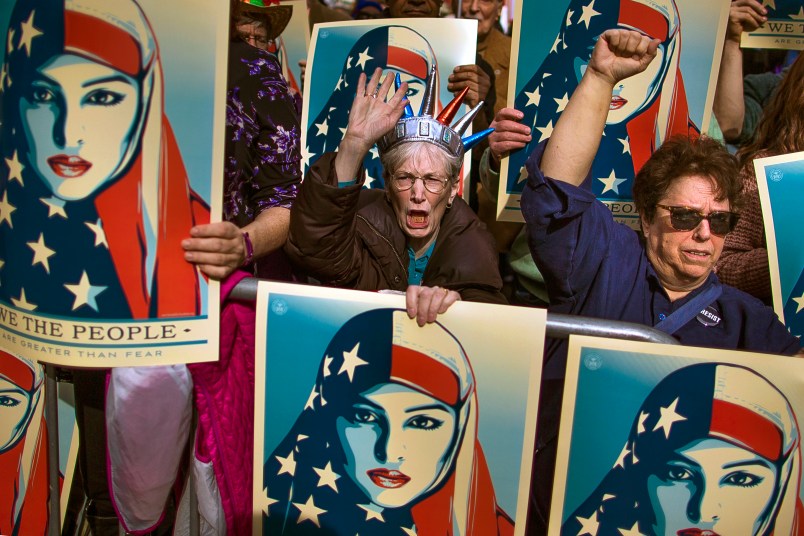McLEAN, Va. (AP) — In a sweeping affirmation of presidential authority, a federal judge in Virginia ruled against a Muslim civil rights group that sought to block the Trump administration’s proposed travel ban.
The ruling Friday by U.S. District Judge Anthony Trenga is at odds with rulings from federal judges in Hawaii and Maryland who have issued orders preventing the bulk of the executive order from taking effect.
Trenga had questioned at a hearing this week whether the injunction sought by the civil rights group is necessary, given the orders already in place from the Hawaii and Maryland judges.
But his 32-page decision goes far beyond that technical question, giving a major victory to the Trump administration and its authority to issue the order, which would temporarily ban immigration from six Muslim-majority countries and suspend the U.S. refugee program.
The legal issue, Trenga wrote, is not to determine whether the executive order “is wise, necessary, under- or over-inclusive, or even fair.”
The judge, a George W. Bush appointee, said his job is simply to determine whether the order “falls within the bounds of the President’s statutory authority or whether the President has exercised that authority in violation of constitutional restraints.”
At this stage of the lawsuit, Trenga concluded, the plaintiffs have not demonstrated a likelihood to succeed on the merits.
A lawyer for the Council on American-Islamic Relations, which brought the Virginia case on behalf of multiple clients, said he will appeal to the 4th U.S. Circuit Court of Appeals in Richmond. That court is already scheduled to hear the government’s appeal from the Maryland case on May 8.
Trenga wrote that the current executive order is substantially different from the first travel ban sought by the Trump administration, which also was blocked by multiple judges before it was rescinded in favor of the current order.
This revised order no longer carves out an exception favoring Christians and other religious minorities from Muslim-majority nations included in the ban. It also spells out the administration’s justification for the ban and does not seek cancellation of existing visas, as the original order did.
The council’s lawyers described it as just a gussied-up version of the “Muslim ban” Trump proposed during his campaign. They urged the judge to look beyond the text and consider its intent in the context of Trump’s public statements, which they say reveal an anti-Muslim bias.
Trenga wrote that the president’s past rhetoric has become less significant given the significant changes between the first and second executive orders.
The Justice Department issued a statement praising the ruling. “As the Court correctly explains, the President’s Executive Order falls well within his authority to safeguard the nation’s security,” spokeswoman Sarah Isgur Flores said.
Gadeir Abbas, the lawyer for the council, said he is thankful the ruling does not affect the nationwide injunctions imposed by the Hawaii and Maryland judges.
“We look forward to the Fourth Circuit and the Supreme Court weighing in on this matter, as those are the bodies that will ultimately decide whether the Constitution will protect the rights of Muslim Americans,” he said.
___
Associated Press writer Alanna Durkin Richer contributed to this report from Richmond, Virginia.
Copyright 2017 The Associated Press. All rights reserved. This material may not be published, broadcast, rewritten or redistributed.







This smells of judicial bias (against the plaintiff).
Mr Tengra - Trumpy Wanker .